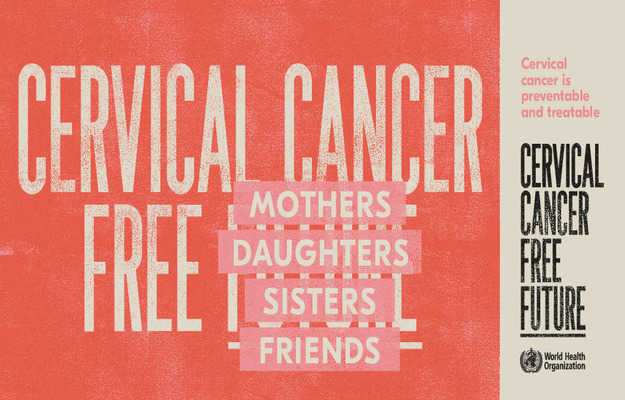India and 193 other countries have joined a global campaign to end cervical cancer sooner, the World Health Organization (WHO) said on 17 November 2020. The goal is to reduce new cases by over 40% and prevent five million cervical cancer-related deaths by 2050, through national programmes to vaccinate, screen and treat girls and women.
According to the WHO, this goal is achievable if by 2030 participating countries can ensure that:
- 90% of girls up to 15 years of age get the HPV vaccine. This is based on the knowledge that 70% of all cervical cancer cases are caused by two types of human papillomavirus (HPV)—HPV16 and HPV18—which can be transmitted via unsafe sex
- 70% of women up to 35 years of age are screened for this cancer at least once using a high-performance test
- 70% of women up to 45 years of age are tested again using a high-performance test
- 90% of women diagnosed with a cervical disease—both pre-cancerous lesions and cervical cancer—get treatment to cure or manage their cancer.
As things stand, according to a 2019 study by the Indian Council of Medical Research or ICMR (based on data from the National Family Health Survey or NFHS-4), fewer than 30% of women aged 30-49 in India have been screened for cervical cancer. Part of the reason for this is sociocultural factors and resistance to routine gynaecological exams because of modesty concerns. Lack of access to proper women’s healthcare may also be a deterrent in some parts of the country.
The cervix is 1-1.5 inches-long canal that connects the uterus to the vagina. Cancer of the cervix (cervical cancer) is preventable and treatable if diagnosed in time. Yet, over 5.11 lakh new cases were reported globally and over three lakh women died of the disease in 2018. According to the WHO, this number could increase to seven lakh new cases and four lakh deaths due to cervical cancer between 2018 and 2030 unless we take steps now.
India accounts for over 15% of cervical cancer deaths in the world. Research has uncovered some of the more effective ways to raise cancer awareness and conduct screening in different parts of the country, including in low-resource areas. These measures include:
- Rural cancer registries
- Camps for cancer detection
- Screening techniques such as visual inspection with acetic acid, visual inspection with Lugol's iodine, visual inspection with magnification devices
- Pap smear
- HPV-DNA testing
- Cervical cytology screening to reduce the incidence of the disease
- One-time screening of high-risk women for tumour markers such as argyrophilic nucleolar organizer regions (AgNOR)
Of course, the ongoing COVID-19 pandemic has disrupted screening and vaccination efforts to detect and control many diseases. In that sense, this campaign comes at an opportune time to step up efforts to control cervical cancer—the fourth most common cancer among women in the world and the second most common cancer among women in India.
“Eliminating any cancer would have once seemed an impossible dream, but we now have the cost-effective, evidence-based tools to make that dream a reality,” WHO Director-General Dr Tedros Adhanom Ghebreyesus said in a news release. “But we can only eliminate cervical cancer as a public health problem if we match the power of the tools we have with unrelenting determination to scale up their use globally,” he added.
Doctors for India joins global campaign to eliminate cervical cancer sooner

Dr. Anil Gupta
Oncology
6 Years of Experience

Dr. Akash Dhuru
Oncology
10 Years of Experience

Dr. Anil Heroor
Oncology
22 Years of Experience

Dr. Kumar Gubbala
Oncology
7 Years of Experience
References
- World Health Organization, Geneva [Internet]. Main event: Launch of the global campaign to accelerate the elimination of cervical cancer, 17 November 2020.
- World Health Organization, Geneva [Internet]. Human papillomavirus (HPV) and cervical cancer, 11 November 2020.
- Srivastava A.N., Misra J.S., Srivastava S., Das B.C., Gupta S. Cervical cancer screening in rural India: Status & current concepts. Indian Journal of Medical Research, 2018; 148: 687-96. Published online: 12 February 2019.







